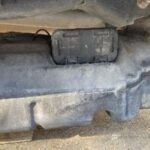The Volkswagen Tiguan, a compact SUV introduced in 2007, offers a stylish design and comfortable seating for five. However, potential buyers often question its reliability. This article delves into the Tiguan’s dependability, highlighting the most and least reliable years, common problems, and maintenance costs to help you make an informed purchase decision.
Volkswagen Tiguan: Most and Least Reliable Years
While some Tiguan model years have proven dependable, others have been plagued with issues. Choosing the right year is crucial for minimizing potential problems and repair costs.
Most Reliable Volkswagen Tiguan Years:
- 2014 Volkswagen Tiguan
- 2015 Volkswagen Tiguan
- 2016 Volkswagen Tiguan
- 2020 Volkswagen Tiguan
- 2021 Volkswagen Tiguan
These model years generally receive fewer customer complaints and report fewer significant issues.
Least Reliable Volkswagen Tiguan Years:
- 2009 Volkswagen Tiguan
- 2010 Volkswagen Tiguan
- 2011 Volkswagen Tiguan
- 2012 Volkswagen Tiguan
- 2017 Volkswagen Tiguan
- 2018 Volkswagen Tiguan
- 2019 Volkswagen Tiguan
Owners of these model years frequently report problems like engine troubles, cooling system issues, recalls, and issues with the plastic intake manifold. Avoiding these years can save you from costly repairs and headaches.
Volkswagen Tiguan Reliability Ratings and Maintenance Costs
Consumer Reports gives the Volkswagen Tiguan a low reliability rating of ⅕. WithClutch assigns it a score of 42.65 out of 100, significantly below the average of 57 for other vehicles. These scores indicate that the Tiguan’s reliability falls below average compared to other SUVs.
RepairPal estimates the average annual repair cost for a Tiguan to be $730, which is approximately $200 higher than the average for all vehicle models. This higher-than-average maintenance cost further underscores the importance of selecting a reliable model year.
Common Volkswagen Tiguan Problems
Regardless of the model year, certain problems are more common in Volkswagen Tiguans:
- Engine Damage and Failure: Particularly prevalent in the 2010 and 2011 models, this serious issue can stem from timing chain tensioner defects and general wear and tear, leading to costly repairs.
- Fuel and Engine Concerns: Issues with fuel delivery and engine performance, such as poor acceleration and hesitation, have been reported across various model years.
- Spark Plug Issues: Instances of broken spark plugs causing significant engine damage highlight the importance of proper maintenance and using quality parts.
- Sunroof Drainage Problems: Blocked or damaged sunroof drainage tubes can lead to leaks, interior damage, and even mold growth, a problem that has spurred a class-action lawsuit against Volkswagen.
Is the Volkswagen Tiguan a Good Choice for You?
While the Tiguan offers appealing features, its below-average reliability and higher-than-average maintenance costs are significant factors to consider. If reliability is a top priority, exploring alternatives might be wise. The Volkswagen Up, Golf, and T-Roc are generally considered more reliable options within the Volkswagen brand.
If you’re set on a Tiguan, choosing one of the more reliable model years (2014, 2015, 2016, 2020, or 2021) is crucial to minimize potential problems and expenses. Thoroughly researching and inspecting any used Tiguan before purchasing is highly recommended. Be prepared for potentially higher maintenance costs compared to other SUVs.

